Denis Thatcher rejected Paul McCartney, David Attenborough and Paul Daniels for Tories' celebratory party
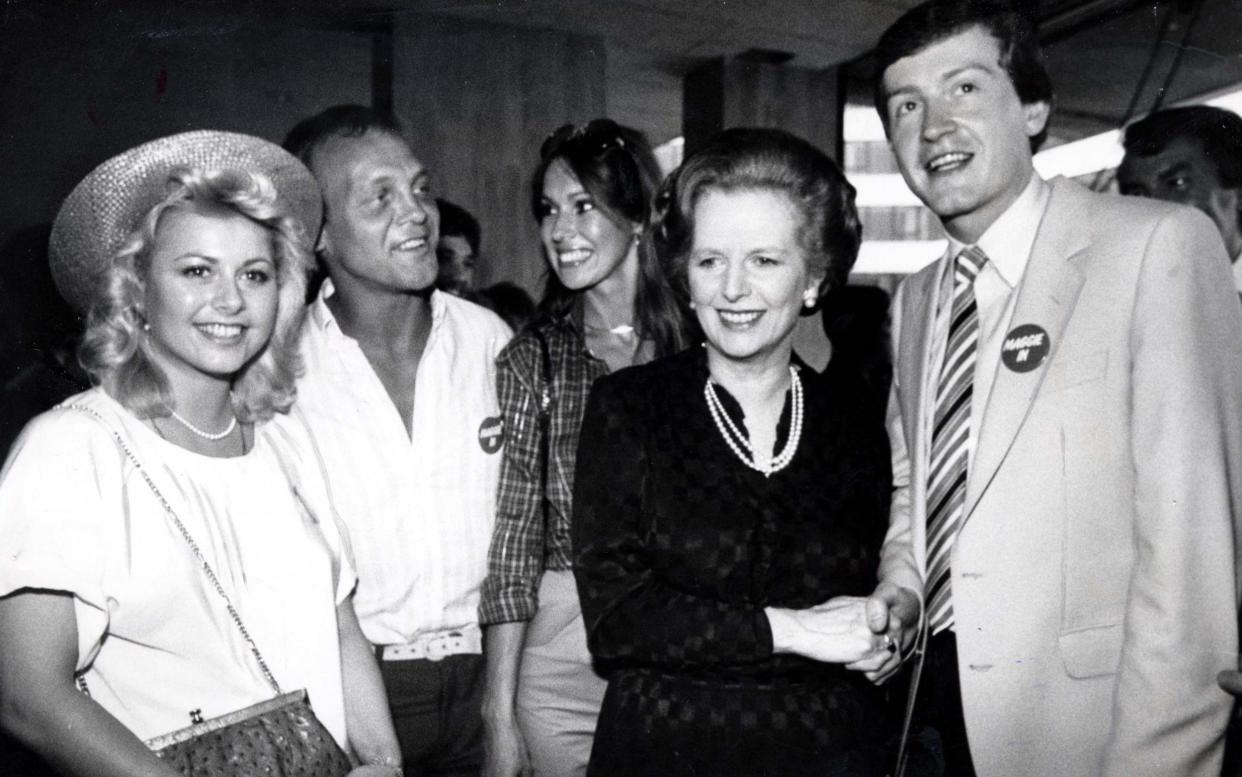
It was the subject of some excitement among the corridors of Number 10, a star-studded reception to thank some of the biggest names in show business for supporting Margaret Thatcher in her election victory.
With the likes of Ronnie Corbett, Bob Monkhouse, Jimmy Tarbuck and Bernie Winters on the list, the Prime Minister could easily have staged a Royal Variety Performance.
But she realised that the 45 who had supported her during a 1987 Wembley rally would not be enough to fill one of her vast reception rooms and asked her aides how they could increase the numbers.
Now private papers released for the first time have revealed that the suggestions caused some consternation and a rare intervention from Denis Thatcher, who took out his red pen to personally vet the guest list. Paul McCartney, David Attenborough and Shirley Bassey were among those who attracted a raised eyebrow.
The plan for what historian Chris Collins, of the Margaret Thatcher Foundation, described as a "fantasy party" were hatched to make the Prime Minister look good on television with "well-known personalities (middle-brow rather more than high-brow) so you can be seen by the public to identify with them".
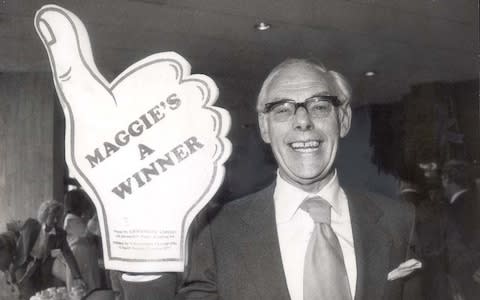
Mrs Thatcher crossed Anthony Hopkins, Antony Sher and Derek Jacobi off a separate reception list so that they could be reserved for the glitzy occasion.
Her private papers from 1988, released under the 30-year rule, show a number of people were asked to contribute names, including John Whittingdale, then a new political secretary, who suggested Paul McCartney, Cliff Richard, Freddie Mercury, Mick Jagger and Jerry Hall, and Andrew Lloyd Webber.
Mr Collins said this was Mr Whittingdale's "idea of a good party", adding: "He was not then the grizzled elder statesman of the present day. This was the young man whose evenings were spent watching Meat Loaf at the Hammersmith Odeon."
But after the list was sent to Number 10, Mr Thatcher sent an annotated version back with an angry handwritten note.
The steam was coming out of his ears at some points in 1988
Chris Collins, Margaret Thatcher Foundation
"Whilst I accept that not everyone who comes to our receptions are necessarily on 'our' side I find it both unpleasant and embarrassing to entertain those who publicly insult the P.M," he said. "This list therefore needs some careful checking in that regard."
Mr Thatcher said he had ticked "those I would personally like to see included" and put a question mark against those he believed "do not help".
He later added that more than one tick "means super person and a known friend and wonderful to have them here". Mr Collins said: "Generally he appears in the files scribbling assent to attend this or that engagement, often with ironic complaint ("Yes - as if I had a choice"). On this occasion he was much more engaged."
Jan Leeming, Shirley Bassey, Janet Brown and Paul Daniels received question marks next to their names despite supporting Mrs Thatcher in the 1987 rally.
Questions were also asked about Sebastian Coe, Paul McCartney and Sir David Attenborough while Gilbert and George, the controversial artists, received two marks next to their names.


Mr Thatcher also questioned the invitation of Trevor Vibert, from the Greater London Arts, and Dr Robert Woof, from the Arts Council, and said that those from the Scottish list should be checked as "we tend to make mistakes" in Scotland and "support our enemies and forget our friends".
Eric Sykes, the actor and comedian, proved the most popular on the list, with no fewer than four ticks from Mr Thatcher.
Peter Alliss, the golfer and presenter; Noel Treddinick, the Director of Music at All Souls Church in Marleybone; Sir Geraint Evans, the Welsh baritone, all received three ticks while Penelope Keith, Judith Chalmers, Monty Modlyn, Tim Rice and Ronnie Corbett received an enthusiastic double tick.
The other Ronnie, Barker, was given the seal of approval with a single tick among a number of others including Rolf Harris, Frederick Forsyth, Dame Judi Dench, Andrew Lloyd-Webber and Donald Sinden.
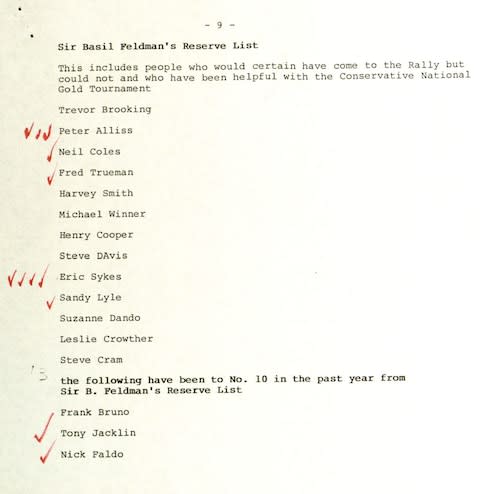

Mr Thatcher did not elaborate on his reasoning and from Mrs Thatcher’s private papers it is unclear what happened to the star-studded guest list.
But a month later, a new plan had been settled on, the documents show, whereby those who supported her during the 1987 Wembley rally were invited alongside the 1988 winter Olympics team and members of the Lords and Commons Ski Club to make up numbers.
This meant that the likes Christopher Biggins and Judith Chalmers were rubbing shoulders with the Earl and Countess of Verulam.
Of those from the rally who were questioned by Mr Thatcher, Ms Brown, who did a Margaret Thatcher impression, and magician Mr Daniels did not make the final list, though it is unclear if they were not invited or declined the invitation as they had prior engagements.
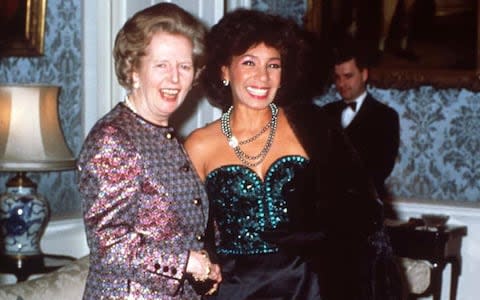
Shirley Bassey, pictured in Downing Street in 1988, was among those who attracted a raised eyebrow
Eddie the Eagle, the skier who shot to fame during the Calgary Games, was notably missing from the final list and has confirmed that - while he was invited - he declined because he had a charity event to attend at Disney World.
Mr Collins said that while aides were "enthusiastic" about the original party, Mr Thatcher was "somewhat irritable" at the time, having just had a run in with the BBC, adding: "The steam was coming out of his ears at some points in 1988".
Mr Thatcher had been in a row with BBC bosses as Number 10 contemplated suing the corporation over a radio play in which she was portrayed as saying she legalised hard drugs.
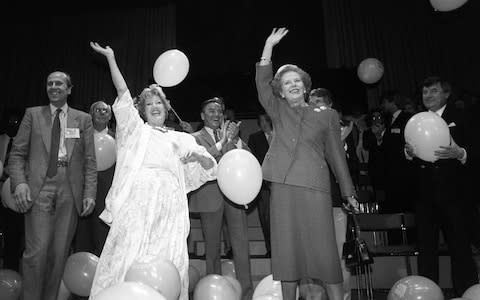
It has previously been revealed that he wrote a strongly worded letter to Marmaduke Hussey, who was chairman of the BBC’s board of governors, complaining: "Never in the history of public broadcasting has so foul a libel been published against anyone."
Now it can be revealed that Mr Hussey replied personally, saying: "I really do not know what to say. If this had been about my wife I should have been absolutely livid."
He apologised profusely and said that the piece "should not have been broadcast", adding: "We have a very long way to go and it is going to take a long time. We are absolutely determined to improve the news and current affairs programmes on both radio and television and have completely changed the entire management team in this area.
"They are set on this difficult but vitally important task and are, you will not be surprised to hear, meeting opposition. But I hope as the year progresses we will both see the results of their efforts."
A selection of the documents can be read at www.margaretthatcher.org.

 Yahoo News
Yahoo News 
